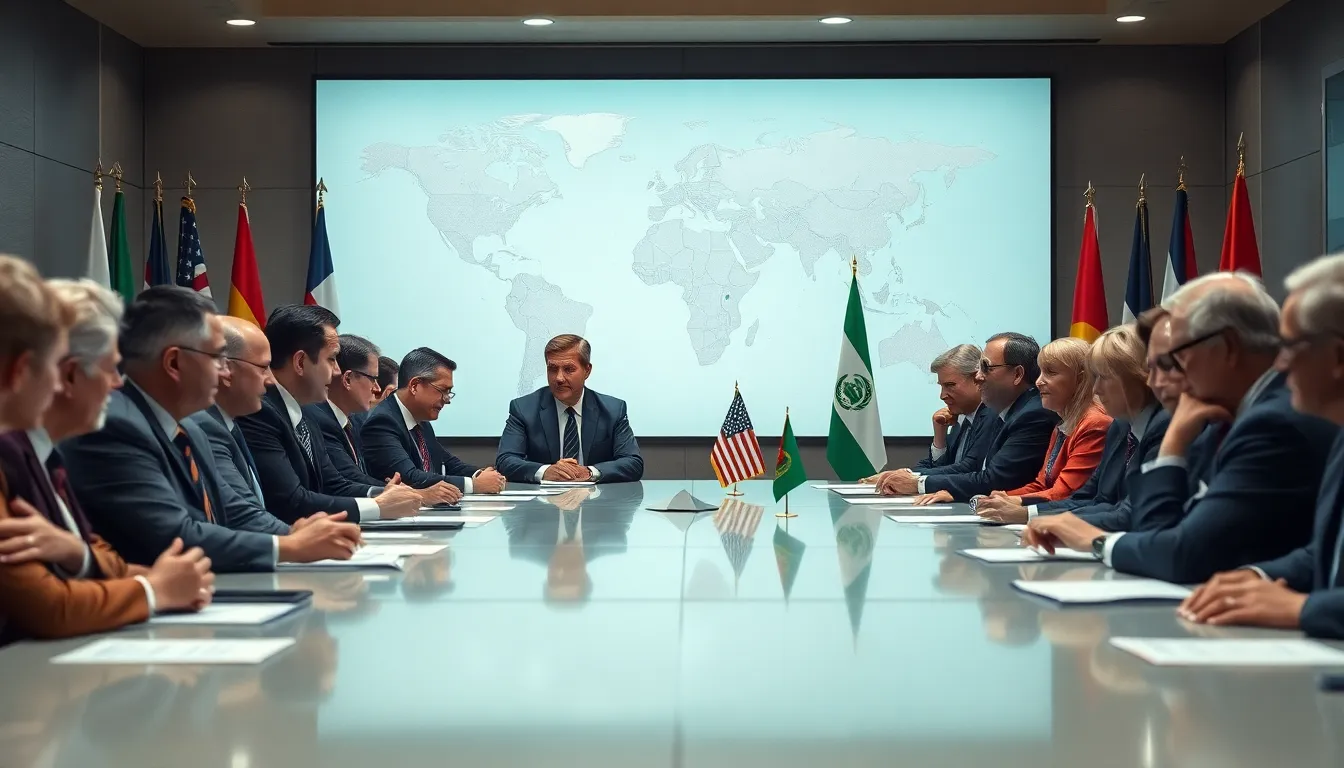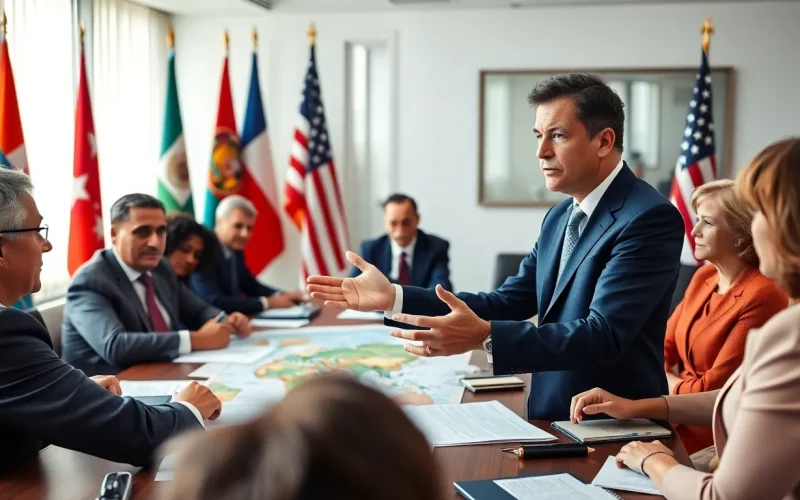Table of Contents
ToggleIn a world where political drama often rivals the best soap operas, global politics has become the ultimate reality show. From unexpected alliances to jaw-dropping betrayals, the stage is set for a thrilling performance that keeps everyone on the edge of their seats. It’s like watching a high-stakes game of chess, but instead of pawns, there are countries with their own agendas, and the stakes are nothing short of global stability.
As tensions rise and new players enter the arena, understanding the current landscape of global politics is more important than ever. Whether it’s trade wars, climate agreements, or international diplomacy, these issues impact daily lives in ways we often overlook. Buckle up, because navigating this chaotic yet fascinating world is essential for anyone who wants to stay informed and engaged.
Overview of Global Politics Now
Global politics represents a complex and dynamic landscape influenced by international relations, core governance, and socio-economic factors. Trade disputes dominate headlines, altering import-export dynamics while impacting global supply chains. Nations engage in negotiations to craft multilateral agreements concerning climate change and environmental sustainability. Emerging economies wield increased influence, often conflicting with traditional powers over diplomatic and economic strategies.
Government actions are crucial in shaping alliances. Nations regularly participate in summits to address pressing global challenges, emphasizing the need for collaboration in achieving sustainable development goals. Tensions rise due to geopolitical rivalries, especially in regions like Eastern Europe and the South China Sea. The influence of social media amplifies public awareness, which in turn affects how policies are formed and implemented.
Public opinion rallies around significant global issues such as human rights, immigration, and global health crises. Awareness campaigns raise the stakes, compelling governments to prioritize responsive actions. Emerging technology also changes how states conduct diplomacy. Cybersecurity threats necessitate new protective measures and international cooperation.
Sanctions and tariffs reflect competitive strategies, preserving national interests while provoking retaliatory measures. International organizations play vital roles in mediating disputes and fostering dialogue among member states. Frequent participation in international forums strengthens cooperation and minimizes conflict.
Shifts in political ideologies influence policy decisions, revealing new priorities and challenges on the horizon. Engaging with global politics requires an understanding of the interconnection between local actions and international responses. Current events illustrate the precarious balance of power, underlining the importance of informed involvement in global affairs.
Key Issues in Global Politics

Global politics faces numerous challenges that require attention and action. Understanding these key issues offers insight into the current geopolitical landscape.
Climate Change and Environmental Concerns
Climate change poses a significant threat to global stability. Rising temperatures and extreme weather events lead to displacement and resource scarcity. Countries increasingly negotiate climate agreements, aiming to reduce carbon emissions and promote sustainability. Efforts like the Paris Agreement underscore this collective push for action. International organizations play crucial roles in facilitating these discussions, fostering collaboration among nations. Without a unified approach, environmental degradation may worsen, impacting economies and societies worldwide.
Economic Inequality and Trade Wars
Economic inequality continues to widen both within and between countries. Trade wars exacerbate these disparities as tariffs disrupt global supply chains. Nations impose tariffs to protect local industries, but repercussions often affect consumers through higher prices. Emerging economies are particularly vulnerable to these shifts, struggling to compete against established markets. Multilateral trade agreements aim to create fairer economic landscapes, yet tensions persist. Addressing economic inequality remains essential for fostering global stability and prosperity.
Geopolitical Tensions and Conflicts
Geopolitical tensions create instability in various regions. Conflicts in Eastern Europe and the South China Sea illustrate the complexities of power dynamics. Nations often assert territorial claims, leading to military confrontations and diplomatic standoffs. Alliances and rivalries shape foreign policies, influencing global relations. Social media amplifies public awareness and activism around these issues, driving international discourse. Effective diplomacy is vital for resolving conflicts and promoting peace in an increasingly interconnected world.
The Role of Major Players
Global politics hinges on the actions and strategies of key nations. Understanding these dynamics reveals their impact on international relations.
United States and Its Influence
The United States remains a dominant force in global politics. Its military power and economic resources shape diplomatic relations. Policies drive trade agreements, affecting countries worldwide. Recent initiatives emphasize alliances in regions like Asia. With a focus on countering rivals, the U.S. engages in partnerships that influence geopolitical stability. Actionable decisions in foreign policy reflect national interests while addressing global challenges.
China’s Growing Power
China’s rise has transformed global dynamics. Economic expansion leads to increased political influence across various regions. Investments in infrastructure projects, such as the Belt and Road Initiative, extend its reach. Diplomatic strategies often emphasize cooperation, though tensions with Western powers can escalate. Additionally, territorial claims in the South China Sea highlight China’s assertiveness. Balancing its growth with international expectations shapes its role in global politics.
The European Union’s Position
The European Union plays a crucial role in fostering regional unity. Member states collaborate on policies that address issues like climate change and trade. Collective action strengthens the EU’s negotiating power on the global stage. Commitment to human rights and democracy often guides its foreign relations. Ongoing challenges include managing economic disparities among members. The EU’s influence in international agreements showcases its dedication to a stable and prosperous world.
Emerging Trends in Global Politics
Global politics continuously evolve, reflecting shifts in power, influence, and priorities among nations. Current trends reveal significant transformations that impact international relations.
Rise of Populism and Nationalism
Populism and nationalism are reshaping political landscapes globally. Political movements capitalize on public discontent with traditional parties, leading to changes in governance. Many countries now see leaders who prioritize national interests over global collaboration. Additionally, these movements often promote anti-immigration policies, changing demographic dynamics in various regions. Such trends can lead to increased domestic focus, potentially undermining international cooperation on critical issues. Voter sentiment increasingly favors leaders who present straightforward solutions to complex problems.
Technology and Cybersecurity
Technology’s influence on global politics grows, presenting both opportunities and challenges. Nations heavily invest in cybersecurity to protect critical infrastructure from cyber threats. Persistent cyberattacks compromise national security, leading to heightened tensions among states. Furthermore, the rise of digital platforms drives political engagement and activism, reshaping public discourse. Information warfare has become a crucial aspect of international relations, impacting elections and governmental stability. As technology continues to advance, its integration into policy-making becomes paramount for addressing emerging geopolitical challenges.
The current landscape of global politics demands active engagement and awareness from individuals everywhere. As nations navigate complex relationships and confront pressing challenges like climate change and economic inequality, the implications for everyday life are profound.
Emerging trends such as nationalism and the impact of technology further complicate these dynamics. Staying informed about these developments is crucial for fostering understanding and promoting collaboration.
Ultimately, the ability to adapt to shifting political ideologies and global priorities will shape the future of international relations. Engaging in informed discussions can contribute to a more stable and cooperative world.





